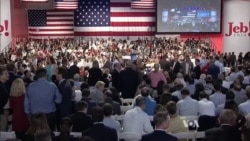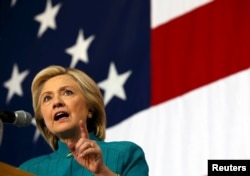Former Florida governor Jeb Bush, the son and brother of U.S. presidents, officially entered the 2016 presidential contest Monday, the 11th Republican in the race, with more candidates likely in the coming weeks.
Bush told cheering supporters at his announcement rally in Miami that the U.S. is on a "very bad course." He blamed Democrats for "the relentless buildup of the regulatory state" and slow U.S. economic growth.
"We need a president willing to disrupt the whole culture in Washington," he said. "I will be that president."
In a Republican Party field dominated by conservatives appealing to the party's base of like-minded voters, Bush cast himself in a campaign video as a candidate appealing to a broader group of voters.
"My core beliefs start with the premise that the most vulnerable in our society should be in the front of the line and not the back,'' Bush said in the video featuring women, minorities and a disabled child. "What we need is new leadership that takes conservative principles and applies them so that people can rise up.''
The 62-year-old Bush has raised tens of millions of dollars for his campaign and was initially thought to be the leading Republican contender. But recent national political opinion surveys show him virtually deadlocked with two other candidates - Florida Senator Marco Rubio, who has joined the contest, and Wisconsin Governor Scott Walker, who has yet to officially announce. Other Republicans are not far behind in the pre-election polling.
Bush name played down
The Bush campaign unveiled an election logo Sunday that reads "Jeb!", ignoring his last name. That branding decision underscored the sentiments of some voters who say they are reluctant to vote for a third Bush presidency, following his father, George H.W. Bush, and his brother, George W. Bush, who oversaw the ultimately unpopular eight-year U.S. war in Iraq.
Jeb Bush has vowed to retain his core beliefs, especially on U.S. immigration and education standards, which have proved to be unpopular among conservative voters who play a key role in the state-by-state Republican presidential nominating process.
The first Republican and Democratic party presidential nominating contests are set for January, with the eventual nominees facing each other in the November 2016 national election. The winner takes over the White House in January 2017, assuming power from President Barack Obama, who is limited by the country's constitution to two terms in office.
Clinton leads on Democratic side
The first contests are party caucuses in Iowa, the rural, middle American state where the leading Democratic presidential contender, former secretary of state Hillary Clinton, campaigned in recent days.
When she sought the presidency in 2008, Clinton fared poorly in the Iowa caucuses, with Obama's victory there giving him an early springboard to the Democratic nomination. Other candidates have joined the contest against Clinton this year, but national public opinion surveys show her the overwhelming favorite to win the Democratic nomination, and she is ahead in possible matchups against the wide array of Republicans seeking their party's nomination.
At a New York rally on Saturday, Clinton promised to promote equal opportunity and to fight for a hard-pressed middle class. She told thousands of supporters she is running for president for all Americans, including those left behind after the recession.
"America can't succeed unless you succeed; that is why I am running for president of the United States," she said to chants of "Hillary, Hillary."
She has criticized the Republican presidential contenders as out of touch with the needs of American voters and their evolving views on several issues.









